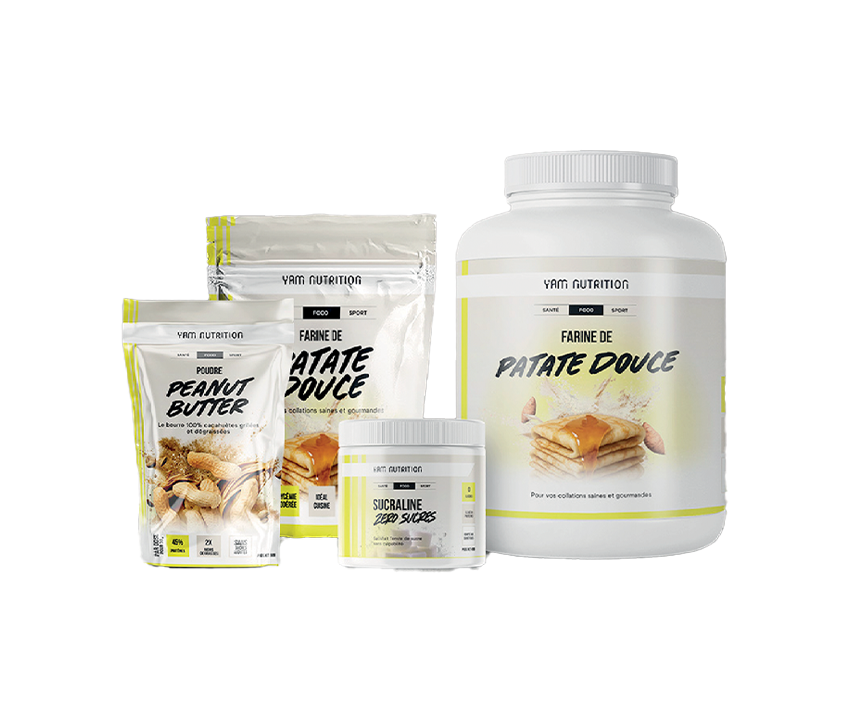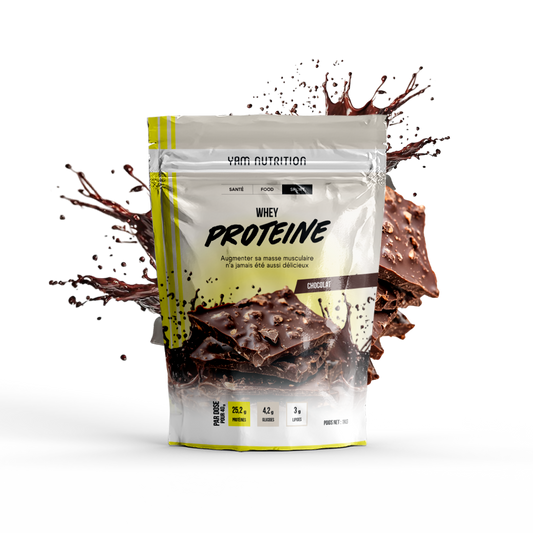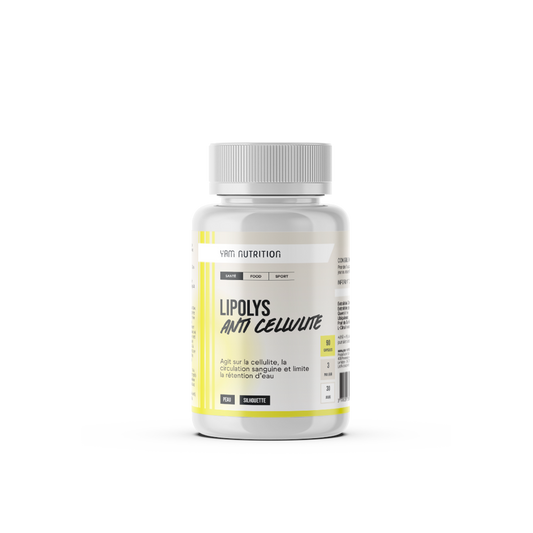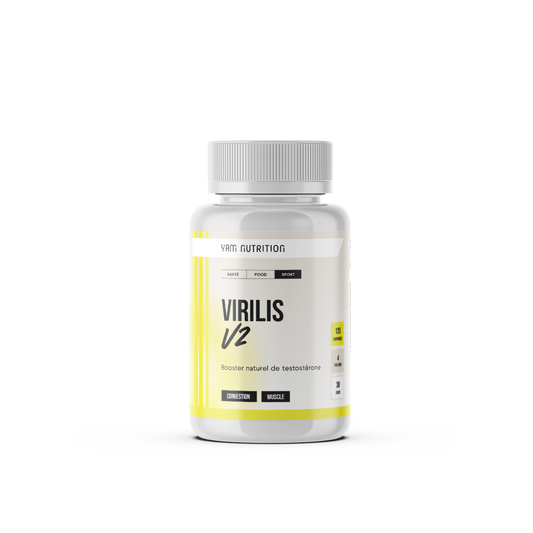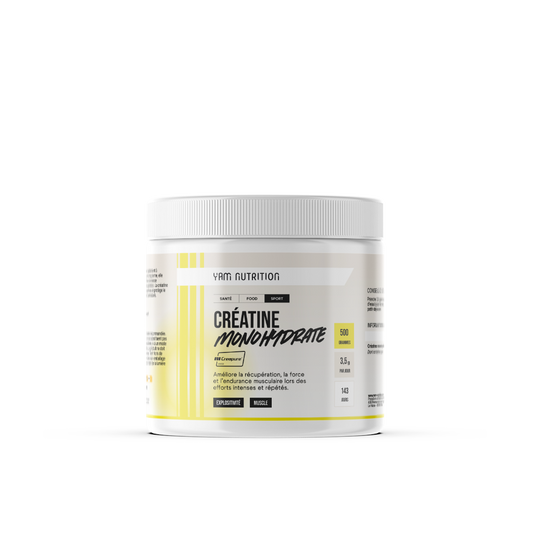Protein supplements

In our small, very closed world of bodybuilding, nutritional supplement retailers have often emphasized the importance of proteins. Scientifically, this is a proven fact, even obvious, since muscle fibers, like all of our tissues, are made of proteins. On a purely physiological level, our sarcomeres actin, myosin, and titin are composed of amino acids. In sports, protein supplements are therefore among the most sought-after nutritional supplements. Naturally, this is not to say that other nutrients are less important for their metabolism. Micronutrients, Vitamins , minerals and antioxidants also have multiple essential roles to play in the health of bodybuilders and their athletic performance.
Building muscle mass has never been so delicious The natural testosterone booster Improves strength, power and muscular endurance during intense and repeated efforts
Whey Protein
Sale price
From 37,90 €
Virilis V2
29,90 €
Sale price
29,90 €
Creatine Monohydrate Creapure®
Sale price
From 34,90 €
However, proteins have many other functions than just building our organic tissues. As you know, they are made up of basic elements, amino acids. Biochemically, these are organic acids linked to an amino base. They are, like fats, Energy substrates , but amino acids can also have many other functions in our bodies. Linked into peptides, amino acids form signal proteins or enzymes that are very small, yet essential for the proper functioning of our metabolism. The different roles played by amino acids and peptides are even more numerous, and we couldn't possibly list them all here. So what about protein supplements ?
Protein food supplements are part of functional foods
Strictly speaking, dietary supplements differ from foods in that they are functional foods. In fact, there are no food sources in nature that contain only 30 grams of protein or 100 mg of vitamin C. These are called functional foods because that is exactly what they do; dietary supplements fulfill a specific function. A protein powder will only provide you with 25 to 30 grams of protein. whereas a multivitamin in tablets will only provide you with vitamins or minerals. To this end, functional foods best complement your diet. Depending on your diet, should you take protein supplements, whey , casein or other protein powders?
A protein powder will give you 25 to 30 grams of pure protein with few calories
You will easily understand that if you have set your quota at 1.6 or 1.8 grams of protein per kilo , it will be much easier for you to reach them with a protein shake than by spending your days cooking. Especially since in this case, you would take more calories than with a simple shake but you would mainly consume carbohydrates and fats in addition, which could prove problematic if you have established a specific diet. It is precisely on this principle ( that of a functional food ) that high-protein diets work and that they give results. A protein shake only provides proteins with a reduced quota of calories. In the drying and muscle definition phase , a shake proves to be simple and practical while it fulfills its role perfectly. Supplements in proteins are also an obvious strategy for gaining muscle and strength.
Protein supplements offered by Yam Nutrition
Casein, an excellent source of amino acids that can be assimilated over several hours...
In order to satisfy both bodybuilders in preparation and those who want to lose weight, we will offer you several types of protein: classic whey – the famous Whey Protein – but also a hydrolyzed form of micellar casein . Hydrolysis is a simple water filtration process, allowing to obtain a maximum of peptides from the protein source, as well as all the free amino acids. In this way, Amino acids and peptides from casein are quickly assimilated to provide energy to your muscle mass during training.
We will also offer you a high nutritional quality Whey because it is a great classic among protein powders. Whey is a source of amino acids Big Yam is a rapidly assimilated carbohydrate that can be taken before or after training , when you need to quickly replenish your body and muscles with nitrogenous substances in order to regain anabolism after training. To go further and also provide you with carbohydrates to stimulate post-exercise recovery, Big Yam can also be consumed. A healthy gainer, Big Yam provides you with the slowly assimilated carbohydrates of sweet potato flour . with a Whey concentrate of excellent nutritional quality. On the other hand, if you wish to avoid carbohydrates, we will offer you casein , an optimal source of proteins and amino acids slow-release to reduce muscle catabolism.
How to distribute your protein powder intake?
Whether you're a bodybuilder in training or someone looking to lose weight, the physiological foundations of your body are the same. Protein supplements will provide you with rapid satiety, but they are also part of energy substrates. This means that they can also serve as an energy source. However, it will always be preferable for amino acids to be used for building or maintaining muscle. From this, you will understand that carbohydrates must be supplied to your body over a period of time around training. whereas protein will be more likely to be provided with meals or after exercise . If you are looking to lose or gain weight , then you will need to consider your carbohydrate and fat intake as well as your calorie intake.
Remember that what really matters for your body is relative to your daily protein intake, depending on your quota to reach ( between 1.6 and 2g/kilo of body weight ) more than considering occasional protein intakes. However, in trained athletes, fractional protein intakes (every 4 hours) will be more effectively used for hypertrophy than in bodybuilding beginners. But in all cases, a positive nitrogen balance over 24, 48 and 72 hours will make more sense as a determinant of muscle growth in the athlete than considering protein intake over a few hours.
YAM Nutrition
Eric MALLET
Spécialiste en Nutrition Sportive
